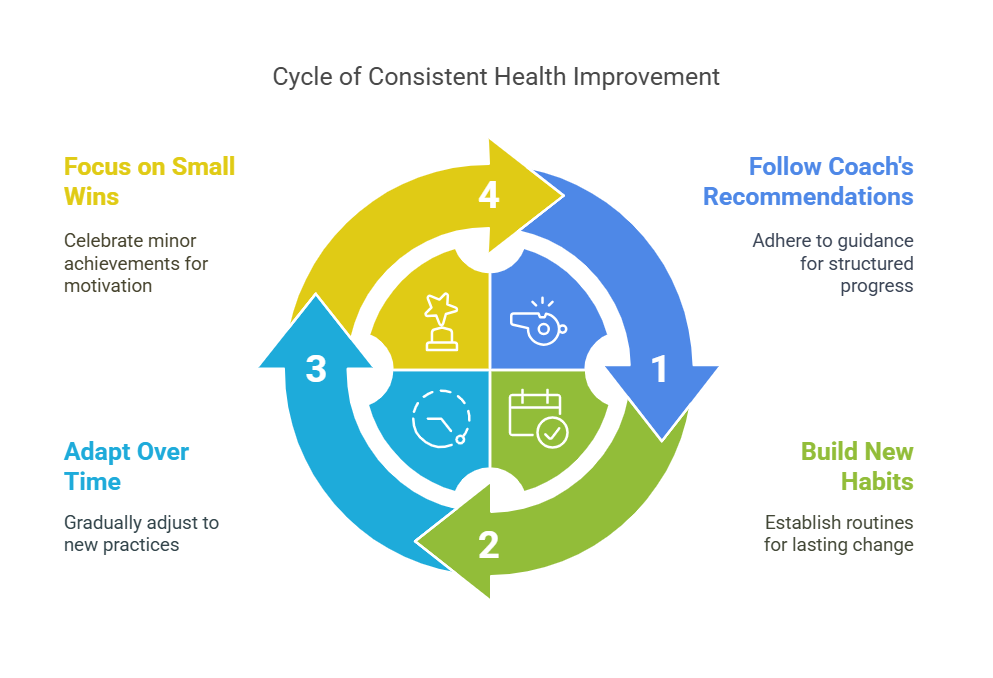How to Find the Best Certified Health Coach for You
Struggling to achieve your health goals? A certified health coach can provide the guidance, support, and accountability you need. But with so many options available, finding the best one can be overwhelming. This guide will walk you through everything you need to know about selecting the best certified health coach tailored to your needs, incorporating the latest trends and industry updates for 2025.
What is a Certified Health Coach?
A certified health coach is a trained professional who helps individuals set and achieve their health and wellness goals through personalized strategies. Unlike general wellness coaches, certified health coaches undergo rigorous training and accreditation, ensuring they have the expertise to provide science-backed guidance on nutrition, fitness, mental health, and lifestyle changes.
Key Responsibilities of a Certified Health Coach:
Personalized health assessments
Goal setting and progress tracking
Nutrition and fitness guidance
Mindset and behavioral coaching
Chronic disease prevention strategies
Why You Need a Certified Health Coach in 2025
The health and wellness industry is evolving rapidly, and in 2025, new trends are shaping how health coaching works. Here are some updated factors influencing the demand for certified health coaches:
1. AI-Integrated Health Coaching
With advancements in AI and wearable technology, certified health coaches now utilize AI-powered health tracking tools for real-time insights into clients' habits, making coaching more precise and data-driven.
2. Personalized Holistic Coaching
Unlike traditional methods, modern health coaches focus on holistic well-being, integrating mental health strategies, stress management, and mindfulness practices into coaching sessions.
3. Virtual and Hybrid Coaching Models
The rise of telehealth coaching means you can now work with a certified health coach remotely through Zoom, app-based coaching, or even virtual reality-assisted fitness sessions.
4. Chronic Disease Prevention Focus
With more people experiencing lifestyle-related illnesses, certified health coaches in 2025 specialize in diabetes management, gut health, and cardiovascular health through tailored wellness plans.
5. Sustainable & Ethical Health Coaching
As people become more conscious about sustainability, health coaches now focus on eco-friendly nutrition and sustainable fitness practices.
How to Choose the Best Certified Health Coach for You
1. Check Their Certification & Accreditation
The best certified health coaches hold credentials from recognized organizations such as:
National Board for Health & Wellness Coaching (NBHWC)
International Coach Federation (ICF)
American Council on Exercise (ACE)
Institute for Integrative Nutrition (IIN)
2. Assess Their Specialization
Different health coaches focus on varying areas, such as:
Weight loss and fitness
Chronic illness management
Mental health and mindfulness
Sports performance optimization
Choose a coach whose expertise aligns with your health goals.
3. Review Their Coaching Methods
Some coaches follow a strict regimen, while others use a flexible, client-driven approach. Look for a coach who adapts to your learning style and motivation level.
4. Check Testimonials & Success Stories
Read reviews, client testimonials, and before-and-after success stories to verify the coach’s effectiveness.
5. Evaluate Communication & Compatibility
A great coach-client relationship is built on trust and compatibility. Schedule a discovery call to see if their personality and coaching style match your expectations.
How to Maximize Your Health Coaching Experience
Working with a certified health coach is a powerful step toward transforming your well-being, but the success of this journey depends on your level of engagement. Here’s how you can maximize your health coaching experience and ensure you get the best results.
1. Be Clear About Your Goals
Before your first session, take the time to define your health and wellness objectives. Vague goals like "I want to be healthier" won’t provide the direction needed for a personalized plan. Instead, be specific.
For example, if your goal is weight loss, specify how much weight you want to lose and within what timeframe. If you are focused on improving sleep, clarify whether your priority is falling asleep faster, sleeping longer, or reducing nighttime wake-ups. The more detailed your goals, the more tailored and effective your coach’s strategies will be.
2. Track Your Progress
Keeping track of your progress helps you stay motivated and provides valuable insights for your coach to refine your plan. You can use fitness trackers, food journals, or mobile apps to monitor your workouts, meal intake, sleep patterns, and stress levels.
Regular progress tracking also allows you to recognize small victories, which can boost your motivation. Whether it’s lifting heavier weights, improving energy levels, or sticking to a consistent sleep schedule, every achievement matters.
3. Stay Consistent
Results in health and wellness take time, and consistency is key. It’s easy to feel discouraged when changes aren’t immediate, but long-term transformation happens through daily habits. Follow your coach’s recommendations even when progress seems slow.
Building new habits takes patience. Whether it's a new fitness routine, dietary changes, or stress management techniques, give yourself time to adapt. Even on difficult days, focus on small wins and keep moving forward.
4. Ask Questions
A good health coaching experience involves active participation. If you are unsure about certain strategies, meal plans, workout modifications, or supplements, ask your coach. They are there to provide guidance and adjust recommendations based on your feedback.
Understanding the "why" behind each suggestion helps you stay committed to the process. Whether it’s learning how specific foods impact your energy levels or why a certain exercise is included in your routine, knowledge empowers you to make informed decisions about your health.
5. Invest in Yourself
Health coaching is an investment in your well-being, just like education or career development. Treat your coaching sessions as a priority, not an optional commitment. Show up prepared, engage fully, and follow through with action steps.
Consider the time and money spent on health coaching as an investment in a longer, healthier life. When you commit to the process, you maximize the benefits and see lasting improvements in your physical and mental health.
Less-Known Facts About Certified Health Coaches
Certified health coaches are not just for weight loss – Many specialize in sleep improvement, stress reduction, and chronic disease management.
Some health coaches work alongside doctors – In 2025, more healthcare professionals collaborate with health coaches to provide integrative care.
Health coaching is now covered by some insurance providers – With the rise in preventive healthcare, certain health coaching programs are now reimbursable.
AI-driven coaching platforms enhance results – Tools like personalized health apps help coaches create data-backed wellness plans.
Nutrition coaching is evolving – Many certified health coaches now integrate genetic testing to tailor diet plans specific to your DNA.
Men’s and Women’s health coaching has distinct approaches – Coaches now tailor strategies specifically for hormonal balance, reproductive health, and age-related wellness.
Resources and Further Reading
To further educate yourself on finding the best certified health coach, consider exploring these resources:
By following these guidelines and utilizing available resources, you can find a certified health coach who is well-suited to help you achieve your health and wellness goals. The right coach can make a significant difference in your journey toward a healthier and happier life.
Conclusion
Finding the best certified health coach in 2025 requires careful consideration of their expertise, coaching methods, and how well they align with your personal health goals. With the rise of AI-powered health tracking, telehealth coaching, and personalized wellness programs, there’s never been a better time to invest in your health. Take the first step today and start your journey toward a healthier, happier life!
The American Natural Health Coach Organization (ANHCO) is a leading institution dedicated to training and certifying health coaches with a strong foundation in holistic wellness. Its Health Coach Certification program equips individuals with evidence-based coaching techniques, nutrition knowledge, and behavior change strategies to help clients achieve long-term health goals. With a focus on integrative health, ANHCO-certified coaches are recognized for their expertise in guiding individuals toward sustainable lifestyle improvements.
FAQS
-
When looking for a certified health coach, ensure they have certification from a reputable organization, such as the National Society of Health Coaches (NSHC), International Coach Federation (ICF), or National Board for Health and Wellness Coaching (NBHWC). In addition to certification, they should have training in areas relevant to your needs (e.g., nutrition, fitness, stress management).
-
To determine if a health coach is suitable, consider your health goals and find a coach who specializes in areas you want to focus on, such as weight loss, chronic disease management, or overall wellness. Look for coaches who have experience working with clients in similar situations or who use coaching techniques aligned with your preferences.
-
Health coaches may use different approaches, such as motivational interviewing, cognitive-behavioral techniques, or holistic wellness coaching. Research the coach's approach, and choose one that resonates with your learning style and goals. Ask for an initial consultation to see if their methods align with your preferences.
-
While personal experience can provide a unique perspective, the coach’s training and professional experience are most important. A coach who has successfully guided clients through challenges similar to yours can provide more relevant advice and insights, even if their personal health journey differs from yours.
-
Communication style is key to effective coaching. During an initial consultation or interview, pay attention to how the coach listens, responds, and whether they make you feel heard and understood. A good coach should ask thoughtful questions, provide clear explanations, and offer feedback in a supportive, non-judgmental way.
-
The cost of a certified health coach can vary widely depending on their expertise, location, and experience. Rates may range from $50 to $200 or more per session. Consider the coach's qualifications, track record of success, and whether they offer packages or ongoing support. If the coach helps you achieve meaningful health improvements, the investment can be worthwhile.
-
You can find certified health coaches through reputable coaching directories (e.g., NBHWC’s directory), referrals from healthcare providers, or recommendations from friends or family. Many health coaches also offer online services, so you can search for coaches who specialize in your specific needs, whether you’re seeking virtual coaching or in-person support.




